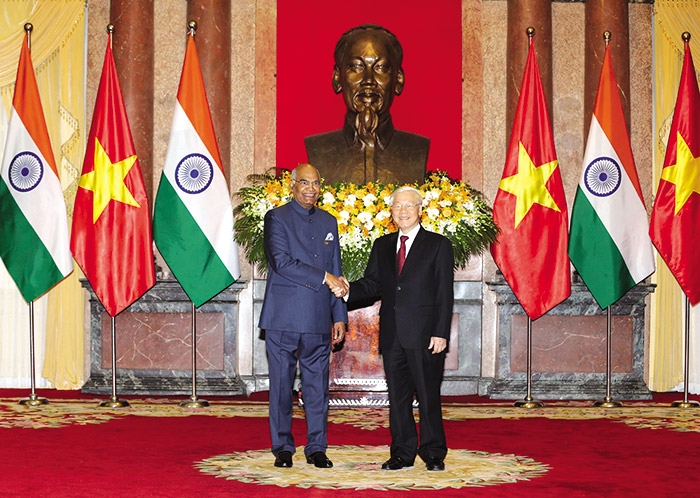Indian firms agree links across range of sectors
 |
| Vietnamese Party General Secretary, State President Nguyen Phu Trong welcomed Indian President Ram Nath Kovind, photo: VNA |
Hari Krishnan R. Nair, president of Western India Cashew Co. Pvt. Ltd. (WIC), spent three days in Vietnam last week to seek business and investment opportunities. On his first visit to the country, Nair met with several domestic partners.
“We want to partner up with Vietnamese companies to import farm produce, especially high-quality cashew nuts,” Nair said.
WIC is India’s leading exporter of roasted cashew, supplying top supermarkets in the US and Europe in shelf-ready formats. In WIC’s business plan it is expanding export markets, thus it has to seek more cashew materials and Vietnam is a good supplier.
WIC is among 60 Indian companies that visited Vietnam last week in search of business and investment opportunities. The enterprises, whose representatives accompanied Indian President Ram Nath Kovind on a state visit to Vietnam during November 18-20, operate in many sectors such as healthcare, agriculture, foodstuffs, IT, biotechnology, energy, oil and gas, infrastructure, services, education, aviation, and tourism.
Jagdish Parikh, director of Bimal Pharma Pvt. Ltd., said that the company seeks, builds, and thrives on long-term business relations only. It wants to seek partners in Vietnam. “Towards efforts to boost our activities in international marketing, we are on the lookout for dealers, distributors, and stockists outside of India,” he said. “We wish them to stock and promote our exclusive range of products in bulk, to supply to various research institutions, industries, research and development centres, as well as microbiology laboratories and hospitals.”
Addressing a Vietnam-India business forum held last week in Hanoi, President Kovind stated that Vietnam is a huge agricultural economy with agro-marine-forestry exports surpassing $35 billion last year. Agricultural products already occupy over 45 per cent of bilateral trade of both nations.
“Agro-processing, agro-chemicals, farm machinery, biotechnology and high-tech farming hold immense potential for bilateral co-operation. The Indian industry can also learn from Vietnam’s success with coffee, peppers, cashew, fruit, and vegetables,” the president said.
According to him, the Indian pharmaceuticals industry is the third-largest globally in terms of volume and the world’s largest provider of generic drugs.
“The companies can partner Vietnam in providing quality healthcare, medicines, and medical devices for the public health system at an affordable cost,” he said. “Indian pharmaceutical companies are also looking at domestic production opportunities in Vietnam. There are huge prospects for promoting medical and wellness tourism both ways as well.”
He further stressed that there is bigger scope for co-operation in energy, oil and gas, power, infrastructure, renewable energy, textiles, biotech, IT, agriculture, infrastructure, and minerals. He and his Vietnamese counterpart Nguyen Xuan Phuc also agreed to enhance co-operation between PetroVietnam and the Indian Oil and Natural Gas Corporation, particularly in terms of oil exploration and exploitation.
“Indian investors, manufacturers, and service providers look to Vietnam with much excitement,” the president said.
For instance, Tata Coffee, a subsidiary of India’s Tata Group, is now fast-tracking the construction of its major freeze-dried coffee plant in Binh Duong province, which will produce 5,000 tonnes of freeze-dried coffee annually. The plant, which began construction in August 2017, will become operational early next year. In March, Tata International Singapore Pte. Ltd. signed a Memorandum of Understanding with Vissai Cement Group to form a joint venture company in Vietnam to utilise Vinh Port owned by the Vissai Group.
According to Vietnam’s Ministry of Planning and Investment, as of October 20, India had 201 valid investment projects in Vietnam registered at $876.7 million.
What the stars mean:
★ Poor ★ ★ Promising ★★★ Good ★★★★ Very good ★★★★★ Exceptional
 Tag:
Tag:
Related Contents
Latest News
More News
- Vietnamese businesses diversify amid global trade shifts (February 03, 2026 | 17:18)
- Consumer finance sector posts sharp profit growth (February 03, 2026 | 13:05)
- Vietnam and US to launch sixth trade negotiation round (January 30, 2026 | 15:19)
- NAB Innovation Centre underscores Vietnam’s appeal for tech investment (January 30, 2026 | 11:16)
- Vietnam moves towards market-based fuel management with E10 rollout (January 30, 2026 | 11:10)
- Vietnam startup funding enters a period of capital reset (January 30, 2026 | 11:06)
- Vietnam strengthens public debt management with World Bank and IMF (January 30, 2026 | 11:00)
- PM inspects APEC 2027 project progress in An Giang province (January 29, 2026 | 09:00)
- Vietnam among the world’s top 15 trading nations (January 28, 2026 | 17:12)
- Vietnam accelerates preparations for arbitration centre linked to new financial hub (January 28, 2026 | 17:09)






















 Mobile Version
Mobile Version